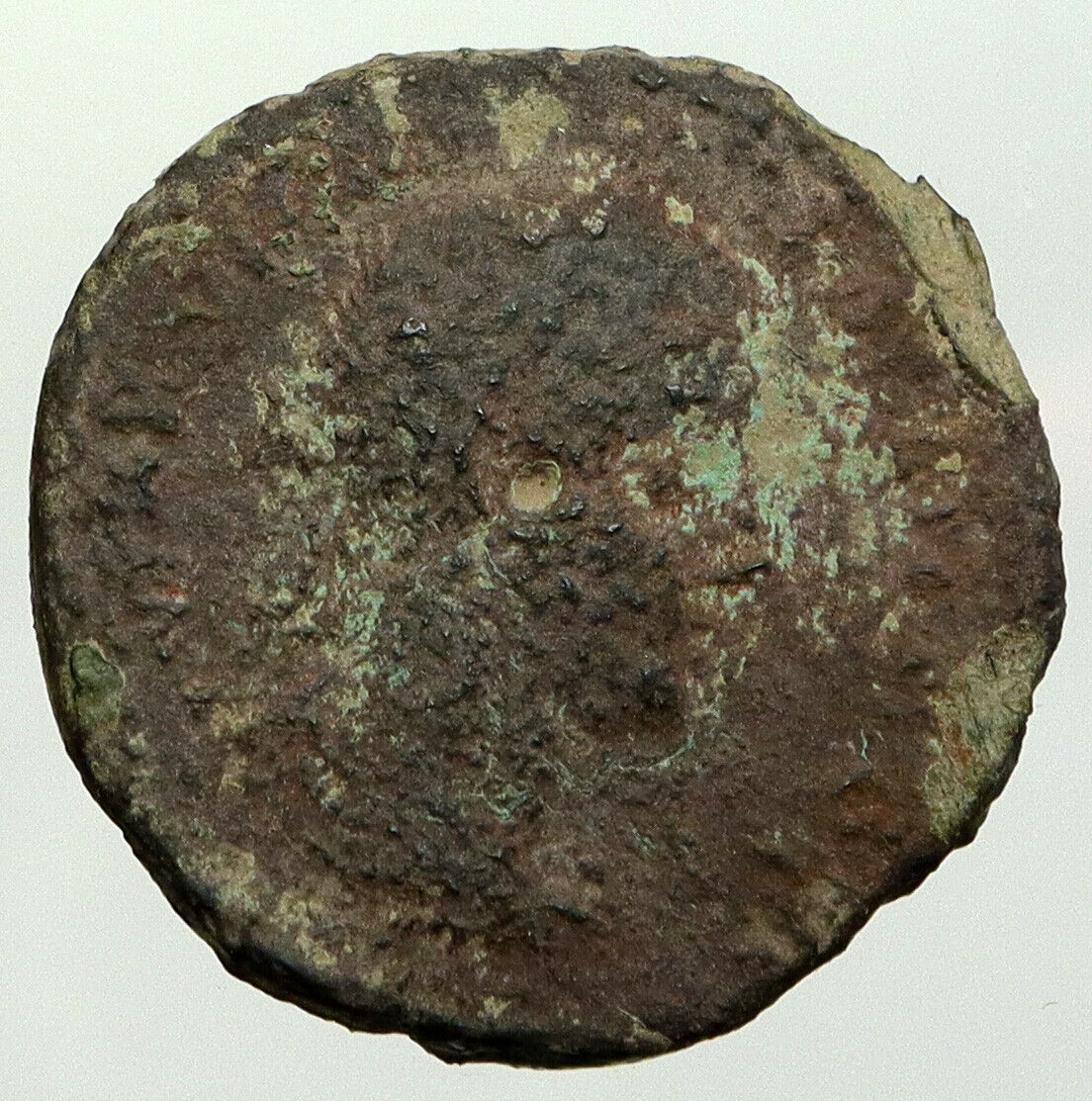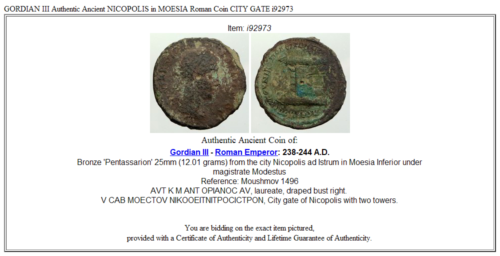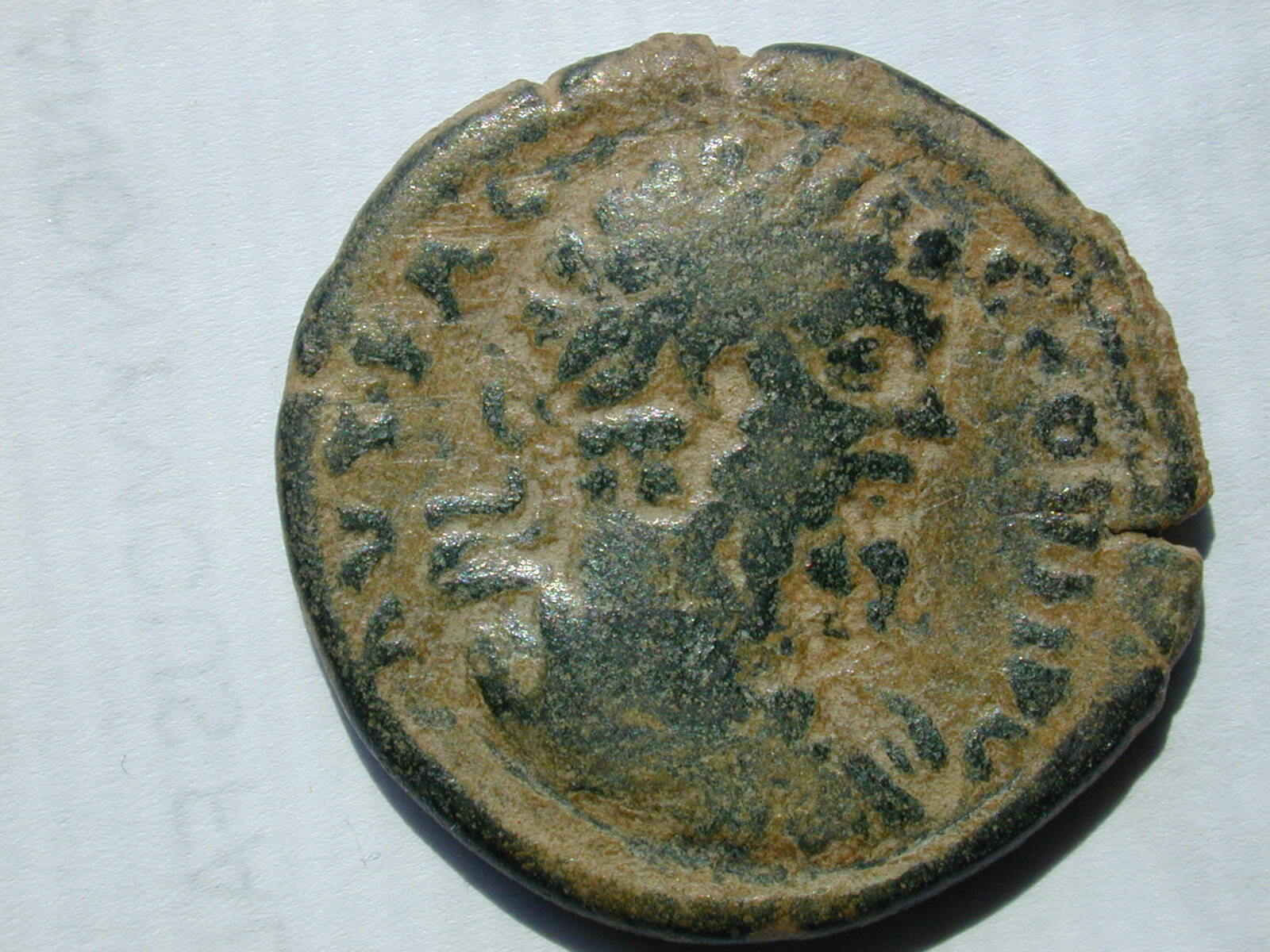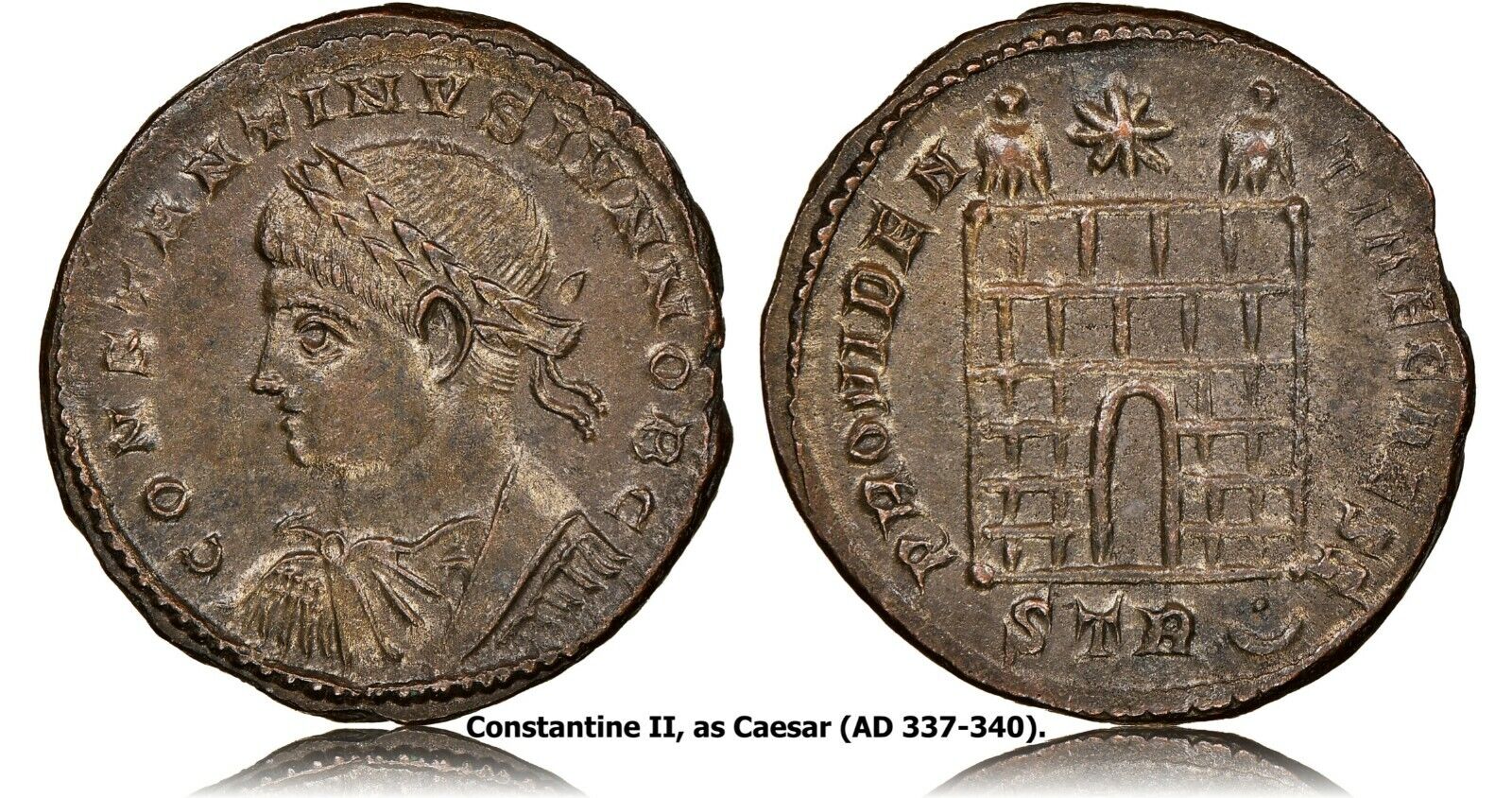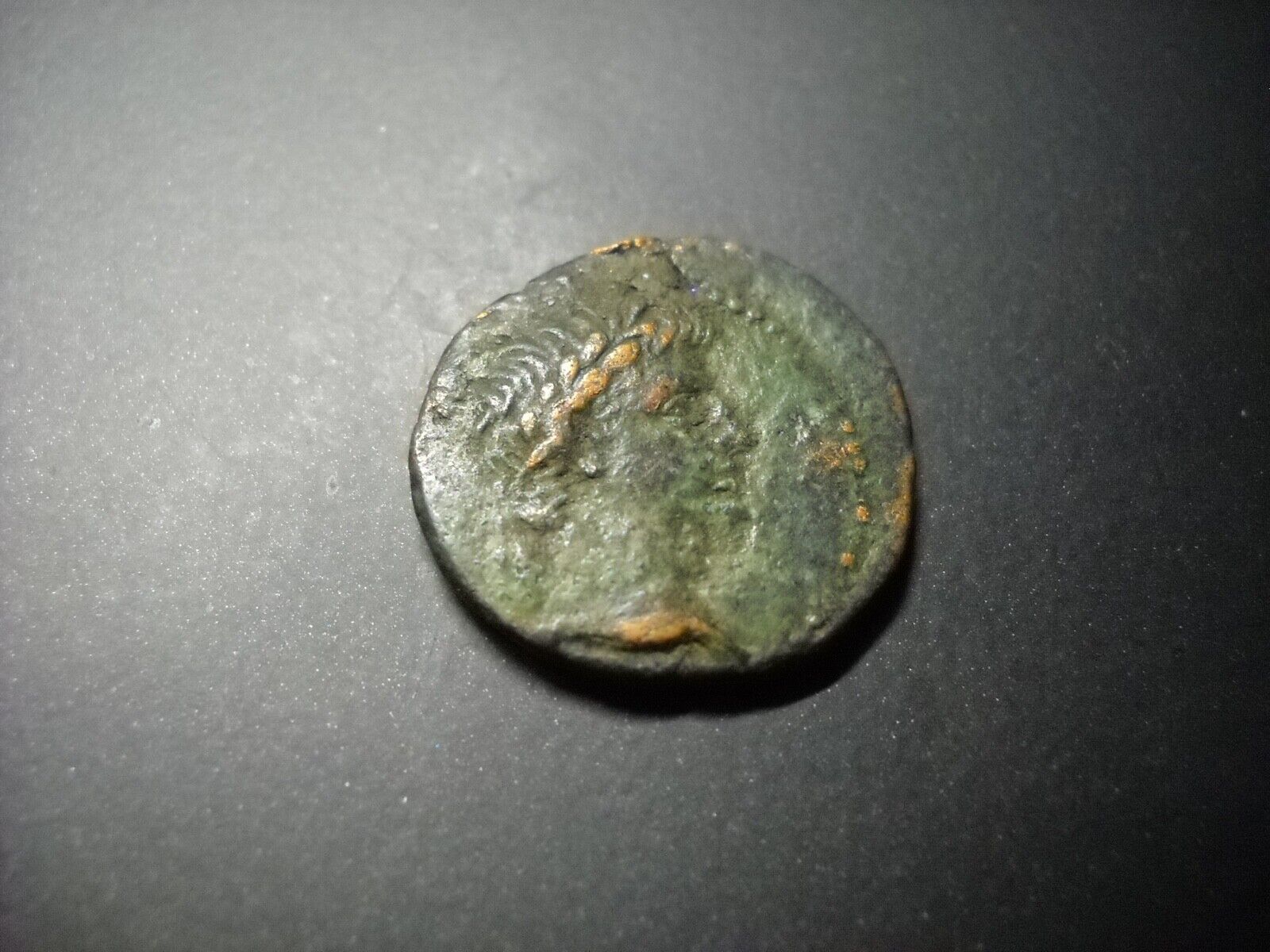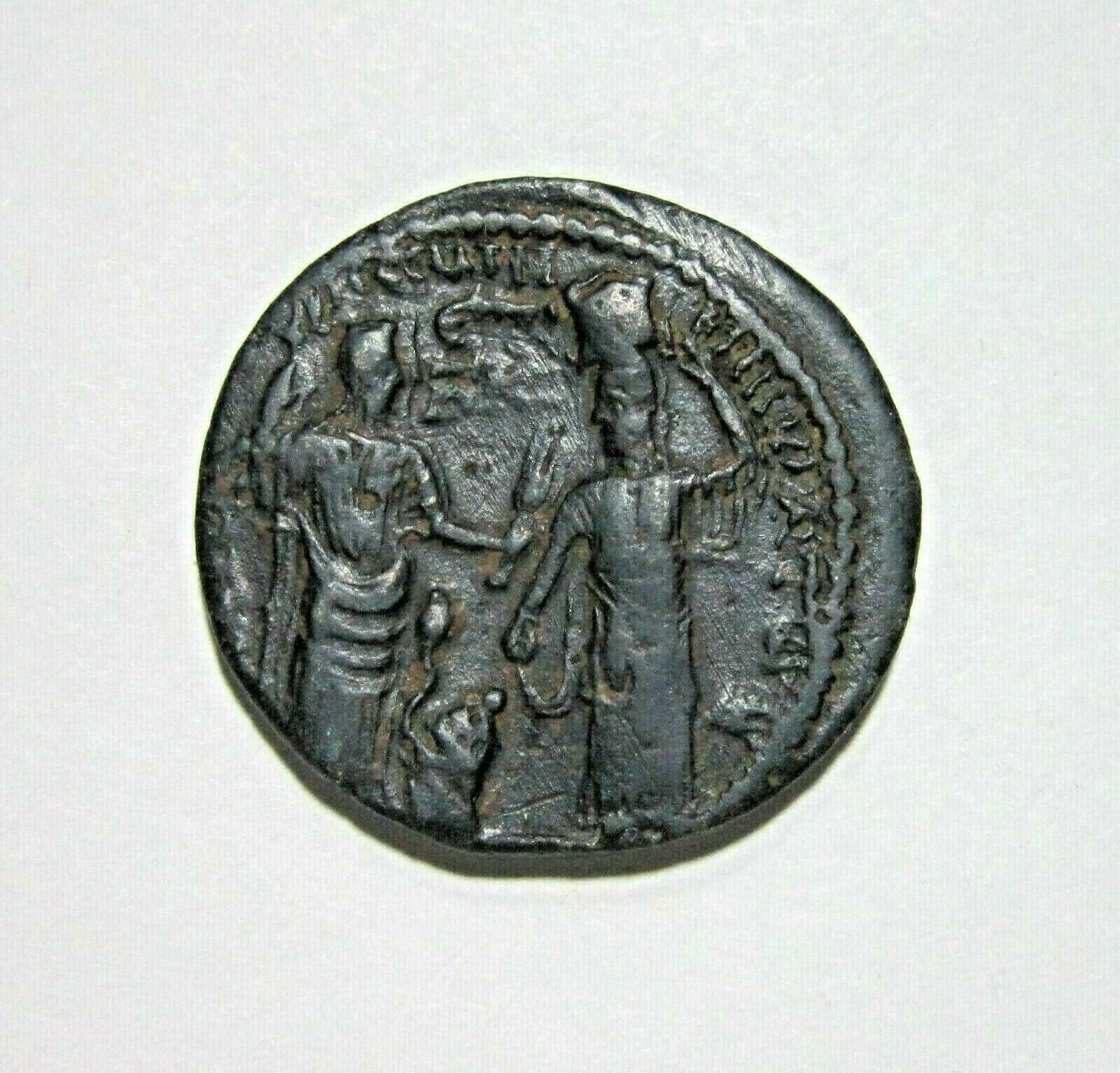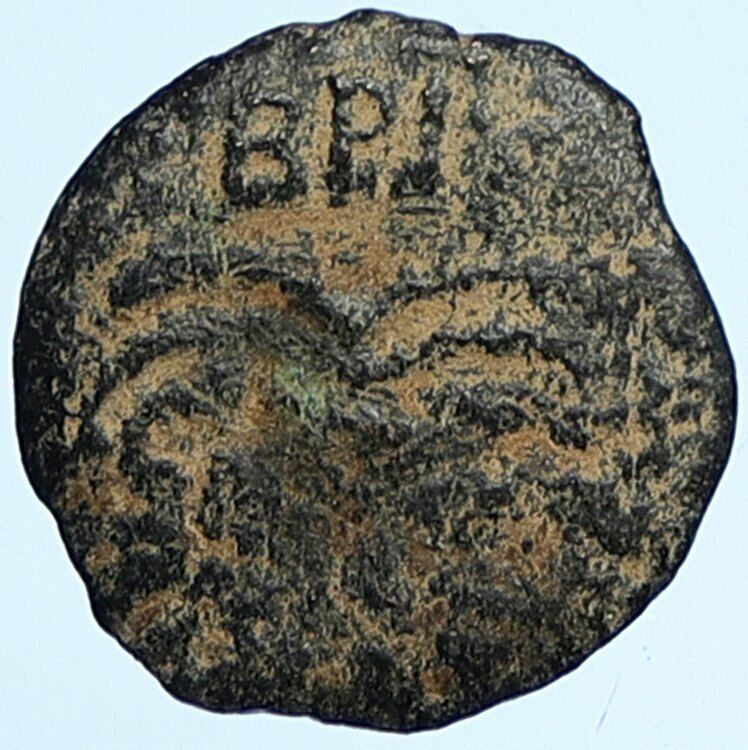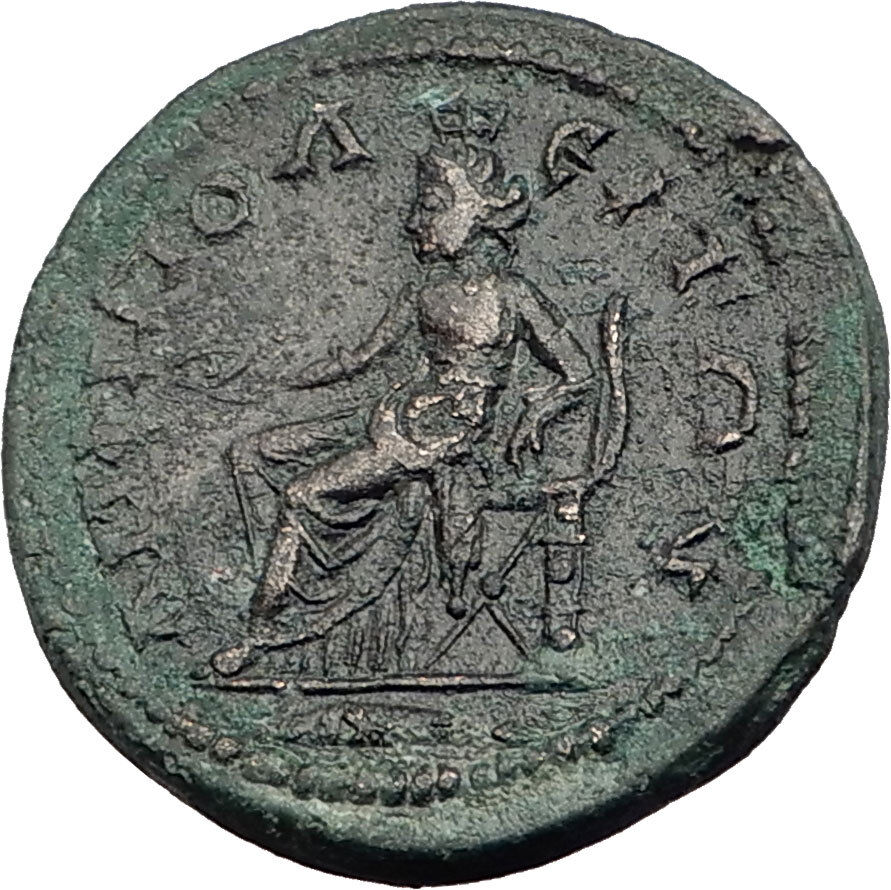-40%
GORDIAN III Authentic Ancient NICOPOLIS in MOESIA Roman Coin CITY GATE i92973
$ 118.08
- Description
- Size Guide
Description
Item:i92973
Authentic Ancient Coin of:
Gordian III
-
Roman Emperor
: 238-244 A.D.
Bronze 'Pentassarion' 25mm (12.01 grams) from the city Nicopolis ad Istrum in Moesia Inferior under magistrate Modestus
Reference: Moushmov 1496
AVT K M ANT ΓOPΔIANOC AVΓ, laureate, draped bust right.
VΠ CAB MOΔECTOV NIKOΠOΛEITΩNITΠPOCICTPON, City gate of Nicopolis with two towers.
You are bidding on the exact item pictured, provided with a Certificate of Authenticity and Lifetime Guarantee of Authenticity.
Nicopolis ad Istrum
was a Roman and Early Byzantine town founded by Emperor Trajan around 101–106, at the junction of the Iatrus (Yantra) and the Rositsa rivers, in memory of his victory over the Dacians. Its ruins are located at the village of Nikyup, 20 km north of Veliko Tarnovo in northern Bulgaria. The town reached its apogee during the reigns of Trajan, Hadrian, the Antonines and the Severan dynasty.
The classical town was planned according to the orthogonal system. The network of streets, the forum surrounded by an Ionic colonnade and many buildings, a two-nave room later turned into a basilica and other public buildings have been uncovered. The rich architectures and sculptures show a similarity with those of the ancient towns in Asia Minor. Nicopolis ad Istrum had issued coins, bearing images of its own public buildings.
In 447 AD, the town was destroyed by Attila's Huns. Perhaps it was already abandoned before the early 400s. In the 6th century, it was rebuilt as a powerful fortress enclosing little more than military buildings and churches, following a very common trend for the cities of that century in the Danube area.The largest area of the extensive ruins (21.55 hectares) of the classical Nicopolis was not reoccupied since the fort covered only one fourth of it (5.75 hectares), in the southeastern corner. The town became an episcopal centre during the early Byzantine period. It was finally destroyed by the Avar invasions at the end of the 6th century. A Bulgarian medieval settlement arose upon its ruins later (10th-14th century).
Nicopolis ad Istrum can be said to have been the birthplace of Germanic literary tradition. In the 4th century, the Gothic bishop, missionary and translator Ulfilas (Wulfila) obtained permission from Emperor Constantius II to immigrate with his flock of converts to Moesia and settle near Nicopolis ad Istrum in 347-8. There, he invented the Gothic alphabet and translated the Bible from Greek to Gothic.
Gordian III
-
Roman Emperor
: 238-244 A.D.
Caesar: 238 A.D. (under
Balbinus
and
Pupienus
)
Augustus: 238-244 A.D.
| Grandson of
Gordian I
| Nephew of
Gordian II
| Adopted Successor of
Balbinus
and
Pupienus
| Husband of
Tranquillina
|
Gordian III
(Latin:
Marcus Antonius Gordianus Pius Augustus
; 20 January 225 AD - 11 February 244 AD) was Roman Emperor from 238 AD to 244 AD. At the age of 13, he became the youngest sole legal Roman emperor throughout the existence of the united Roman Empire. Gordian was the son of Antonia Gordiana and an unnamed Roman Senator who died before 238. Antonia Gordiana was the daughter of Emperor Gordian I and younger sister of Emperor Gordian II. Very little is known of his early life before his acclamation. Gordian had assumed the name of his maternal grandfather in 238 AD.
In 235, following the murder of Emperor Alexander Severus in Moguntiacum (modern Mainz), the capital of the Roman province Germania Superior, Maximinus Thrax was acclaimed Emperor. In the following years, there was a growing opposition against Maximinus in the Roman senate and amongst the majority of the population of Rome. In 238 a rebellion broke out in the Africa Province, where Gordian's grandfather and uncle, Gordian I and II, were proclaimed joint emperors. This revolt was suppressed within a month by Cappellianus, governor of Numidia and a loyal supporter of Maximinus Thrax. The elder Gordians died, but public opinion cherished their memory as peace-loving and literate men, victims of Maximinus' oppression.
Meanwhile, Maximinus was on the verge of marching on Rome and the Senate elected Pupienus and Balbinus as joint emperors. These senators were not popular men and the population of Rome was still shocked by the elder Gordian's fate, so the Senate decided to take the teenager Gordian, rename him Marcus Antonius Gordianus like his grandfather, and raise him to the rank of
Caesar
and imperial heir. Pupienus and Balbinus defeated Maximinus, mainly due to the defection of several legions, particularly the II
Parthica
, who assassinated Maximinus. However, their joint reign was doomed from the start with popular riots, military discontent and an enormous fire that consumed Rome in June 238. On July 29, Pupienus and Balbinus were killed by the Praetorian Guard and Gordian proclaimed sole emperor.
Rule
Due to Gordian's age, the imperial government was surrendered to the aristocratic families, who controlled the affairs of Rome through the Senate. In 240, Sabinianus revolted in the African province, but the situation was quickly brought under control. In 241, Gordian was married to Furia Sabinia Tranquillina, daughter of the newly appointed praetorian prefect, Timesitheus. As chief of the Praetorian Guard and father in law of the Emperor, Timesitheus quickly became the
de facto
ruler of the Roman Empire.
In the 3rd century, the Roman frontiers weakened against the Germanic tribes across the Rhine and Danube, and the Sassanid Empire across the Euphrates increased its own attacks. When the Persians under Shapur I invaded Mesopotamia, the young emperor opened the doors of the Temple of Janus for the last time in Roman history, and sent a large army to the East. The Sassanids were driven back over the Euphrates and defeated in the Battle of Resaena (243). The campaign was a success and Gordian, who had joined the army, was planning an invasion of the enemy's territory, when his father-in-law died in unclear circumstances. Without Timesitheus, the campaign, and the Emperor's security, were at risk.
Gaius Julius Priscus and, later on, his own brother Marcus Julius Philippus, also known as Philip the Arab, stepped in at this moment as the new Praetorian Prefects and the campaign proceeded. Around February 244, the Persians fought back fiercely to halt the Roman advance to Ctesiphon. Persian sources claim that a battle occurred (Battle of Misiche) near modern Fallujah (Iraq) and resulted in a major Roman defeat and the death of Gordian III. Roman sources do not mention this battle and suggest that Gordian died far away from Misiche, at Zaitha (Qalat es Salihiyah) in northern Mesopotamia. Modern scholarship does not unanimously accept this course of the events. One view holds that Gordian died at Zaitha, murdered by his frustrated army, while the role of Philip is unknown. Other scholars, such as Kettenhofen, Hartman and Winter have concluded that Gordian died in battle against the Sassanids.
Philip transferred the body of the deceased emperor to Rome and arranged for his deification. Gordian's youth and good nature, along with the deaths of his grandfather and uncle and his own tragic fate at the hands of the enemy, earned him the lasting esteem of the Romans. The soldiers held Gordian in high esteem, as he had possibly sacrificed his life to save them in 244.
Frequently Asked Questions
Mr. Ilya Zlobin
, world-renowned expert numismatist, enthusiast, author and dealer in authentic ancient Greek, ancient Roman, ancient Byzantine, world coins & more.
Who am I dealing with?
You are dealing with Ilya Zlobin, ancient coin expert, enthusiast, author and dealer with an online store having a selection of over 15,000 items with great positive feedback from verified buyers and over 10 years experience dealing with over 57,000 ancient and world coins and artifacts. Ilya Zlobin is an independent individual who has a passion for coin collecting, research and understanding the importance of the historical context and significance all coins and objects represent. Most others are only concerned with selling you, Ilya Zlobin is most interested in educating you on the subject, and providing the largest selection, most professional presentation and service for the best long-term value for collectors worldwide creating returning patrons sharing in the passion of ancient and world coin collecting for a lifetime.
How long until my order is shipped?
Orders are shipped by the next business day (after receipt of payment) most of the time.
How will I know when the order was shipped?
After your order has shipped, you will be left positive feedback, and that date could be used as a basis of estimating an arrival date. Any tracking number would be found under your 'Purchase history' tab.
USPS First Class mail takes about 3-5 business days to arrive in the U.S. International shipping times cannot be estimated as they vary from country to country.
Standard international mail to many countries
does not
include a tracking number, and can also be slow sometimes.
For a tracking number and signature confirmation, you may want to do Express Mail International Shipping, which costs more, however, is the fastest and most secure. Additionally you may be able to receive your order in as little as 3-5 business days using this method. For Express Mail International, it may be possible to place up to 10-15 items in one package (for the one shipping cost) as it is flat rate envelope, which may be the most cost-effective, secure and fastest way to receive items internationally. Send me a message about this and I can update your invoice should you want this method.
Getting your order to you, quickly and securely is a top priority and is taken seriously here.
Great care is taken in packaging and mailing every item securely and quickly.
Please be aware, I cannot take responsibility for any postal service delivery delays, especially for international packages as it may happen in rare instances.
What is a certificate of authenticity and what guarantees do you give that the item is authentic?
Each of the items sold here, is provided with a Certificate of Authenticity, and a Lifetime Guarantee of Authenticity, issued by a world-renowned numismatic and antique expert that has identified over 57,000 ancient coins and has provided them with the same guarantee. You will be very happy with what you get with the COA; a professional presentation of the coin, with all of the relevant information and a picture of the coin you saw in the listing. Additionally, the coin is inside it's own protective coin flip (holder), with a 2x2 inch description of the coin matching the individual number on the COA.
On the free-market such a presentation alone, can be considered a - value all in itself, and it comes standard with your purchases from me,
FREE.
With every purchase, you are leveraging my many years of experience to get a more complete context and understanding of the piece of history you are getting. Whether your goal is to collect or give the item as a gift, coins presented like this could be more prized and valued higher than items that were not given such care and attention to.
Buy a coin today and own a piece of history, guaranteed.
Is there a money back guarantee?
I offer a 30 day unconditional money back guarantee. I stand behind my coins and would be willing to exchange your order for either store credit towards other coins, or refund, minus shipping expenses, within 30 days from the receipt of your order. My goal is to have the returning customers for a lifetime, and I am so sure in my coins, their authenticity, numismatic value and beauty, I can offer such a guarantee.
When should I leave feedback?
Once you receive your order, please leave a positive feedback. Please don't leave any negative feedbacks, as it happens sometimes that people rush to leave feedback before letting sufficient time for their order to arrive. Also, if you sent an email, make sure to check for my reply in your messages before claiming that you didn't receive a response. The matter of fact is that any issues can be resolved, as reputation is most important to me. My goal is to provide superior products and quality of service.
How and where do I learn more about collecting ancient coins?
Visit the "
Guide on How to Use My Store
" for on an overview about using my store, with additional information and links to all other parts of my store which may include educational information on topics you are looking for.
